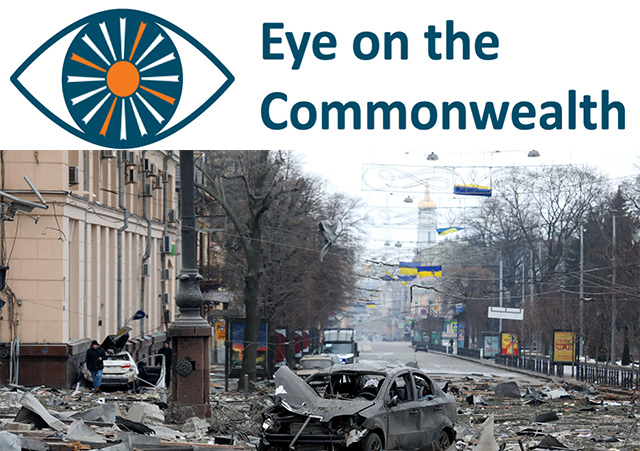 March 1st: A burnt-out car on the street after a missile launched by Russian invaders hit near the Kharkiv Regional State Administration building in Svobody (Freedom) Square. [photo: Alamy]
March 1st: A burnt-out car on the street after a missile launched by Russian invaders hit near the Kharkiv Regional State Administration building in Svobody (Freedom) Square. [photo: Alamy]
The crisis sparked by Russia’s invasion of Ukraine has seen the United Nations come together in a way rarely seen in its 76-year history. It has prompted unusually forthright condemnation from the Commonwealth secretary-general, Patricia Scotland, who said: ‘What we are witnessing is a culmination of the gradual fraying of the rules-based international order which has kept our post-war world intact’, and a dark warning from Kenya of the dangers of fanning the ‘embers of dead empires’. It has also exposed some painful fence-sitting by the Commonwealth’s aspiring superpower, India.
After Russia vetoed a resolution, the UN security council referred the crisis to the general assembly for the first time in four decades. At the assembly’s emergency session, only the 11th since the 1956 Suez crisis, country after country condemned Russia’s aggression, demanding that member states take sides and choose between peace and aggression. However, India, which has since the UN’s earliest days seen itself as entitled to a permanent seat on the security council, did its standing in the world no favours by adopting a position of almost perverse neutrality.
At the security council’s meeting on 21 February, as Russian troops massed on Ukraine’s border, the Indian permanent representative to the UN, TS Tirumurti, merely called for ‘restraint on all sides’. Two days later, as reports emerged of heavy shelling from the Russian-occupied Donetsk and Luhansk regions of eastern Ukraine and targeting of civilian sites, and one ambassador after another appealed for Moscow to step back from all-out war, Tirumurti spoke only of the ‘legitimate security interests of all parties’, refusing to condemn Russia’s invasion.
On 25 February, even as the International Criminal Court prosecutor, Karim Khan QC, announced he would be monitoring potential war crimes in Ukraine (the investigation was formally opened on 2 March), India abstained in the security council vote on a resolution demanding that Moscow immediately halt its attack and withdraw all forces. Tirumurti made it clear that Delhi’s concerns for the 20,000 Indians in the war zone were paramount but Ukraine’s ambassador to the UN, Sergiy Kyslytsya, directly criticised India’s stance, saying: ‘You should be the first to vote to stop the war – to save your nationals in Ukraine.’ Kyev’s envoy added that he was ‘saddened’ that a ‘small handful of [UN] members’ seemed to be ‘tolerating’ the war.
It fell to some of the smallest states at the UN to speak out against Vladimir Putin’s naked aggression. Walton Alfonso Webson, of Antigua and Barbuda, said Russia’s security concerns did not justify any use of force and that when the principles of self-determination and sovereignty were threatened anywhere, the international community had to speak out, ‘lest our silence be misconstrued as consent’.
Harold Adlai Agyeman, of Ghana, also implicitly criticised some countries’ studious neutrality, saying that failure to condemn Russia’s actions undermined the pillars ‘that have held our world together, regardless of its imperfection’. Despite Ghana’s longstanding friendship with Russia, it condemned its aggression, saying that despite any security concerns ‘threatening aggression is wrong and unacceptable’.
One of the most powerful speeches heard over the past week came from Kenya’s representative, Martin Kimani. An eloquent warning – to other African states as well as Russia – of the hazards of redrawing borders in pursuit of ethnic homogeneity, a clip of the address was viewed more than 3m times on one Twitter feed. It is worth quoting at length:
‘Kenya and almost every African country was birthed by the ending of empire. Our borders were not of our own drawing … today, across the border of every single African country live our countrymen, with whom we share deep historical, cultural, and linguistic bonds.
‘At independence, had we chosen to pursue states on the basis of ethnic, racial, or religious homogeneity, we would still be waging bloody wars these many decades later. Instead, we agreed that we would settle for the borders that we inherited, but we would still pursue continental political, economic and legal integration.
‘Rather than form nations that looked ever backwards into history with a dangerous nostalgia, we chose to look forward … we chose to follow the rules of the Organisation of African Unity and the United Nations Charter, not because our borders satisfied us, but because we wanted something greater, forged in peace.
‘We believe that all states formed from empires that have collapsed or retreated have many peoples in them yearning for integration with peoples in neighbouring states … However, Kenya rejects such a yearning from being pursued by force. We must complete our recovery from the embers of dead empires in a way that does not plunge us back into new forms of domination and oppression.
‘We rejected irredentism and expansionism on any basis, including racial, ethnic, religious or cultural factors. We reject it again today.’
Commonwealth Update became Eye on the Commonwealth in January 2022. After 38 years in print form, the column has moved from the Round Table journal to the Round Table’s website. Originally Commonwealth Notebook, the column became Commonwealth Update in 1993. The new-look Eye on the Commonwealth will seek to provide a perspective on a topical development by the journal’s Commonwealth Update editor, Oren Gruenbaum.
Related articles:
India resists growing pressure to condemn Russia’s Ukraine invasion – Round Table
How did Asia countries vote on the UN’s Ukraine resolution? – The Diplomat
UN votes to condemn Russia’s invasion of Ukraine and calls for withdrawal – The Guardian



